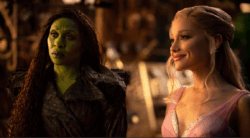Jekyll & Hyde, Mask & Bauble’s spring production, is not a show for literary purists. If you’re looking for Robert Louis Stevenson’s critique of rigid Victorian society and its seedy underworld, this campy musical certainly won’t satisfy. Despite the thinned-out material and lengthy running time, however, the show’s gleeful cast provides some exceptional moments in a largely frivolous musical.
 The play opens with Dr. Jekyll (Kevin Bender, COL ’09) contemplating the duplicitous nature of man, resolving to find a cure for both his ill father and man’s evil nature. As the doctor battles the elite Board of Governors to gain permission to use a human subject for his experiment, the audience is cautioned against the façade of “society, propriety, sobriety, and piety” that the governors represent. Inspired by a visit to a seedy bar, where he meets a prostitute named Lucy (Kate Dennis, COL ’09), Jekyll takes it upon himself to test his potion. As you may have guessed, the rest of the play deals with Jekyll’s transformation and his struggle with Hyde, the hideous alter-ego brought out by his concoction.
The play opens with Dr. Jekyll (Kevin Bender, COL ’09) contemplating the duplicitous nature of man, resolving to find a cure for both his ill father and man’s evil nature. As the doctor battles the elite Board of Governors to gain permission to use a human subject for his experiment, the audience is cautioned against the façade of “society, propriety, sobriety, and piety” that the governors represent. Inspired by a visit to a seedy bar, where he meets a prostitute named Lucy (Kate Dennis, COL ’09), Jekyll takes it upon himself to test his potion. As you may have guessed, the rest of the play deals with Jekyll’s transformation and his struggle with Hyde, the hideous alter-ego brought out by his concoction.
Currently in rehearsals, the show is still in its developmental stages. So far, the biggest problems are structural. Though “The Strange Case of Dr. Jekyll and Mr. Hyde” is most often remembered for its allegorical portrayal of good and evil, its real genius lay in exposing the dangers of hypocrisy and pretense. Jekyll & Hyde doesn’t abandon this theme, but it never convincingly makes the connection to Jekyll’s motivation for turning himself into a living science experiment. It further muddies things with nebulous concerns about the destructive powers of science and extraneous love stories that are never fleshed out.
Re-framed in a modern moment, Mask & Bauble’s staging is neither here nor there, failing to strike a contemporary feel while entirely discarding the era of Stevenson’s original. Instead of providing insight into current hot-topic issues of scientific ethics, the play only casually alludes to them on the way to syrupy love songs.
Technically, though, Jekyll & Hyde is a stunning success; sultry lighting and rain pour at exactly the right time with gifted musicians playing behind the scenes. The set is a highlight of the show, with variegated test tubes set against a stunning backdrop that conveys mad science and the frenzied world that Jekyll/Hyde inhabits.
The production is further buoyed by a group of actors that clearly enjoy each other—the musical is often at its best when they are all on stage together. Hyde kills about half the cast as London’s high society shrieks and croons “Murder, Murder” in one of the most captivating numbers. They might be singing about brutal violence, but the cast is as alive and vivacious as the anxious British upper class.
Much of the show, though, rests in the hands of a few actors. Bender’s beautifully resonant voice and the charming Matt Lai (COL ’11) generally light up the stage. Jimmy Dailey (COL ’11) is flawlessly creepy as a sinister pimp. And Kate Dennis can sing. Not in the sugary pop star way, but in the belt-it-out, seduce everyone in sight, including the audience, way. But she and several others are clearly more comfortable singing than acting, letting potentially powerful moments go by awkwardly.
At over two hours, Jekyll & Hyde is not short and it certainly does not keep up the tempestuous suspense of Stevenson’s classic, but the talented efforts of the cast and crew ensure a good time.





So this is a review of a rehearsal? I find that rather pointless. How can you critique a show that is not finished yet? Rather unnecessary article, I should only be reading a review of a finished show, nothing otherwise.
Well there was some confusion with what the production company wanted. They had, at first, wanted The Voice to do a review of this, calling it the “press preview night” and not detailing that there would be a later, more rehearsed version until a few days later. I find it rather pointless to have two articles written, like they had wanted in the first place, so this is no fault of the writer. It’s merely a misunderstanding.